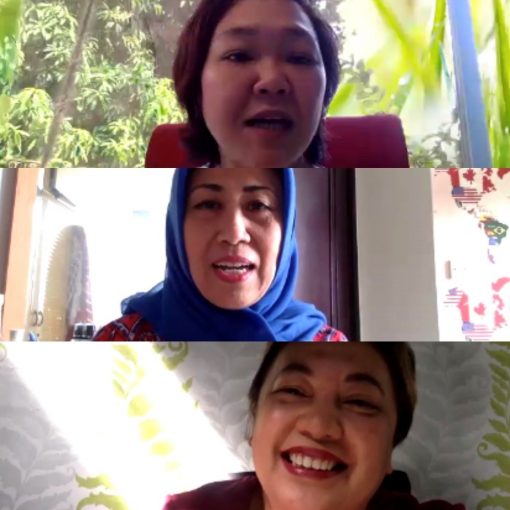
Yogyakarta, 28 June 2020—Department of Communication Sciences Universitas Gadjah Mada organized a discussion titled Ngopi (Ngobrol Pagi) #3. Several women speakers were invited, including Dr. Ninik Rahayu, S. H., M. S. representing Ombudsman Republik Indonesia, Anita Wahid as the Presidium of Mafindo, and Novi Kurnia, Ph.D. as a lecturer in Department of Communication Sciences UGM. Highlighting women, hoax, and the 2020 local elections, the discussion examined the issue at hand very carefully and succeeded in providing fresh insights to the audience. Generally, the discussion underlined women’s vulnerability vis-à-vis information disorder taking place around the time of local elections.
Local elections have been a hot topic, as the government and the parliament announced that they would be held in 9 December despite the economic and health crisis. Similar with previous elections, the risk of hoax around this year’s local elections was obvious. The fight against hoax should be of concern for different stakeholders, especially women in the fight against it. However, the involvement of women poses a question: what if women themselves are targets of hoax?
In her speech, Ninik Rahayu asserted that women are challenged by four facets of the society in terms of elections. Culturally, women are restrained by patriarchy which subordinates and marginalizes them. Second, women are socially restricted by widespread perception that elections are men’s affairs. The lack of education on politics for women also hinders their participation. Lastly, women’s political rights are often suppressed by discriminative policies. Although an affirmative action which provides a 30% quota for women in politics is in place, discriminative tendencies persist, i.e. women objectification in practice of hoax dissemination amidst elections.
Commenting to the phenomenon, Anita Wahid as a representation of Mafindo elaborated how women were part of information disorder, with topics usually centering around sexuality, religion, and morality-related politics. Based on Anita’s observation with Mafindo, women targeted by hoax include public and non-public figures. In terms of false information, women are usually “utilized” as “weapon of hoax” or become subject to hoax.
According to a research by Novi Kurnia—lecturer in Department of Communication Sciences UGM—86.6% of information disorder occurs on Whatsapp through different channels, ranging from personal communication to groups of friends, family members, colleagues, and communities. False information is easily accepted by the receiver due to receiver’s incompetence in processing information. Hence, different responses emerged. At least four types of responses were found, including staying indifferent, verifying the information, giving verification, or leaving the group.
Another spotlight should be given to the tendency of objectifying women in dissemination of false information. Use of sexist words, usually leaning towards sexual harassment, indicates such tendency. For instance, “There is a picture of a women on the ballot paper which has not been punched in/voted on,” metaphorically meaning the woman has not been “penetrated”. The remark proved that degrading women was effective as a tool to disseminate false information. Therefore, digital literacy should be enhanced—especially for women—to empower, encourage, and to realize critical women, as well as abolish digital discrepancy and improve competence in processing information.
